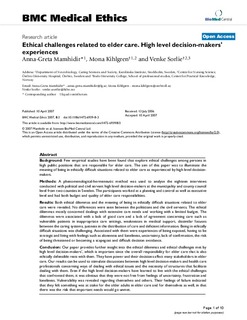| dc.contributor.author | Mamhidir, Anna-Greta | |
| dc.contributor.author | Kihlgren, Mona | |
| dc.contributor.author | Sørlie, Venke | |
| dc.date.accessioned | 2015-08-04T11:55:01Z | |
| dc.date.accessioned | 2015-08-05T12:42:41Z | |
| dc.date.available | 2015-08-04T11:55:01Z | |
| dc.date.available | 2015-08-05T12:42:41Z | |
| dc.date.issued | 2007 | |
| dc.identifier.citation | Mamhidir, A-G., Kihlgren, M. & Sørlie, V. (2007). Ethical challenges related to elder care. High level decision-makers' experiences. BMC Medical Ethics, 8: 3. doi: | nb_NO |
| dc.identifier.issn | 1472-6939 | |
| dc.identifier.uri | http://hdl.handle.net/11250/294913 | |
| dc.description.abstract | Few empirical studies have been found that explore ethical challenges among persons in high public positions that are responsible for elder care. The aim of this paper was to illuminate the meaning of being in ethically difficult situations related to elder care as experienced by high level decision-makers. A phenomenological-hermeneutic method was used to analyse the eighteen interviews conducted with political and civil servant high level decision-makers at the municipality and county council level from two counties in Sweden. The participants worked at a planning and control as well as executive level and had both budget and quality of elder care responsibilities. Both ethical dilemmas and the meaning of being in ethically difficult situations related to elder care were revealed. No differences were seen between the politicians and the civil servants. The ethical dilemmas mostly concerned dealings with extensive care needs and working with a limited budget. The dilemmas were associated with a lack of good care and a lack of agreement concerning care such as vulnerable patients in inappropriate care settings, weaknesses in medical support, dissimilar focuses between the caring systems, justness in the distribution of care and deficient information. Being in ethically difficult situations was challenging. Associated with them were experiences of being exposed, having to be strategic and living with feelings such as aloneness and loneliness, uncertainty, lack of confirmation, the risk of being threatened or becoming a scapegoat and difficult decision avoidance. Our paper provides further insight into the ethical dilemmas and ethical challenges met by high level decision-makers', which is important since the overall responsibility for elder care that is also ethically defensible rests with them. They have power and their decisions affect many stakeholders in elder care. Our results can be used to stimulate discussions between high level decision-makers and health care professionals concerning ways of dealing with ethical issues and the necessity of structures that facilitate dealing with them. Even if the high level decision-makers have learned to live with the ethical challenges that confronted them, it was obvious that they were not free from feelings of uncertainty, frustration and loneliness. Vulnerability was revealed regarding themselves and others. Their feelings of failure indicated that they felt something was at stake for the older adults in elder care and for themselves as well, in that there was the risk that important needs would go unmet | nb_NO |
| dc.language.iso | eng | nb_NO |
| dc.publisher | BioMed Central | nb_NO |
| dc.rights | Navngivelse 3.0 Norge | * |
| dc.rights.uri | http://creativecommons.org/licenses/by/3.0/no/ | * |
| dc.title | Ethical challenges related to elder care. High level decision-makers' experiences | nb_NO |
| dc.type | Journal article | nb_NO |
| dc.type | Peer reviewed | nb_NO |
| dc.date.updated | 2015-08-04T11:55:01Z | |
| dc.rights.holder | © 2007, The Author(s) | |
| dc.subject.nsi | VDP::Medical disciplines: 700::Health sciences: 800::Medical/dental ethics, behavioural sciences, history: 805 | nb_NO |
| dc.source.pagenumber | 10 | nb_NO |
| dc.source.volume | 8 | nb_NO |
| dc.source.journal | BMC Medical Ethics | nb_NO |
| dc.identifier.doi | 10.1186/1472-6939-8-3 | |
| dc.identifier.cristin | 678950 | |

